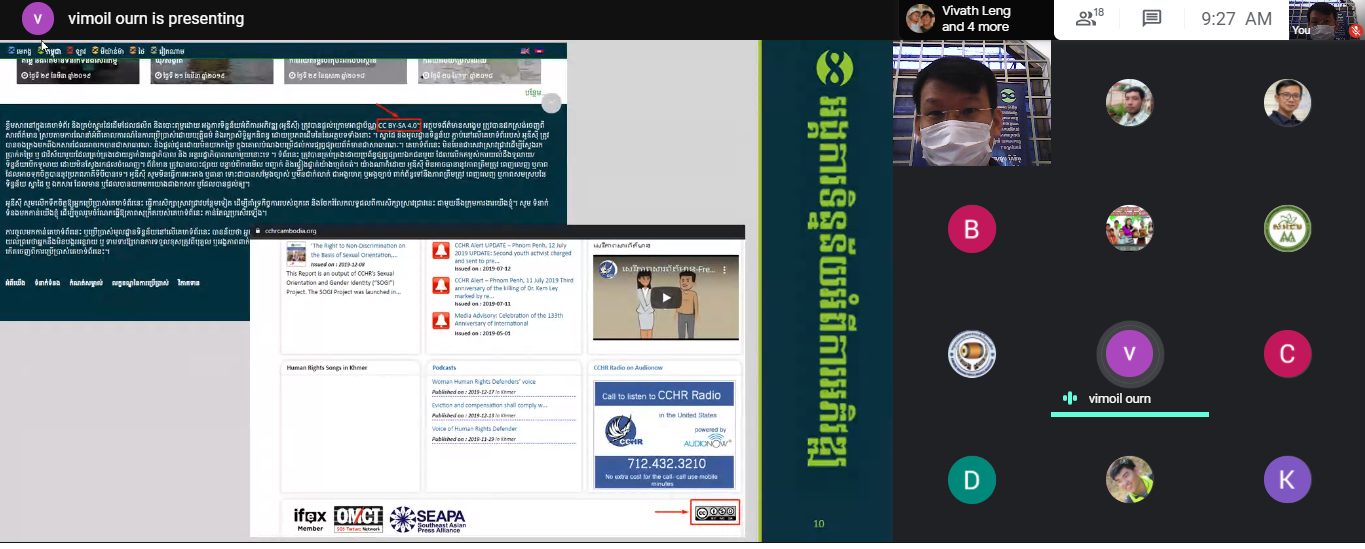Seminar on Indigenous Data Sovereignty (IDS)
On 3 January 2021, Open Development Cambodia (ODC), in collaboration with the Cambodia Indigenous People Organization (CIPO) conducted a half-day virtual seminar on “Indigenous Data Sovereignty (IDS)”. The event was part of the ongoing project coordinated by Open Development Mekong and its national partners, which seeks to improve data collection and data literacy skills to build a centralized data repository for the region. The seminar was funded by the McKnight Foundation through the East West Management Institute (EWMI).
The virtual seminar gathered fifteen participants dedicated to improving the welfare of indigenous peoples (IP), including representatives of the focus group Women of the Indigenous People; local NGOs from Ratanakiri, Mondulkiri, Kratie, and Pursat, and international NGOs such as Oxfam Ratanikiri and OHCHR of the United Nations.
The seminar had three main interrelated objectives. Firstly, to raise awareness about the CARE Principles among relevant stakeholders and IP communities. Secondly, to encourage IP community groups to take ownership of their data as primary beneficiaries for the realization of their collective rights. Thirdly, to disseminate the recent translation of the CARE Principles into Khmer language – done by ODC in collaboration with CIPO and other IP organizations – which seeks to facilitate the accessibility and circulation among indigenous communities.
The seminar commenced with an opening speech from Mr. Thy Try, the Executive Director of ODC. He expressed his delight in welcoming participants into the virtual seminar and regretted that the event had to be finally conducted online due to the COVID-19 situation in Cambodia. Mr. Try emphasized the importance of understanding the concept and implications of Indigenous Data Sovereignty in order to adequately leverage it and avoid any misunderstandings. Next, all participants introduced themselves and provided an overview of their professional background.
The first session of the seminar was conducted by Ms. Ourn Vimoil, Program and Partnership Officer at ODC, who reviewed the core concepts of open data, including data definitions and the operationalization of data licenses. During her presentation, participants engaged in several short exercises for which they had to identify the multiple symbols associated with different types of licenses. This hands-on activity provided participants with a better understanding of data licensing to prevent them from misusing data.

For the following session, Ms. Pyrou Chung, director of the Open Development Initiative (ODI), joined the virtual seminar from Myanmar. She introduced an application for teamwork called Miro for participants to discuss during her presentation. She posed the three following questions for participants to discuss and present their answers: What is the knowledge you have about the community? Who has that knowledge and how is that knowledge passed on? How do you record all this knowledge? Ms. Chung explained that participants are crucial in the information collection process given that all their knowledge about their respective communities constitutes data. She went on to explain the difference between the concept of sovereignty and the difference between indigenous data sovereignty and indigenous data governance (IDG) given that “sovereignty can have different meanings.” Ms. Chung said, “At the local level, sovereignty means the right to self-governance of their communities in regards to their tradition, customs, and beliefs.” She further explained the distinctions between IDS and IDG in response to the question of one participant, highlighting that IDS is the right of indigenous people to utilize their data for the best of their society whereas IDG are the processes and solutions associated with how the data should be utilized for the society.

Later on, Ms. Pok Sokny, Indigenous Community Development Officer of CIPO presented about three main points, namely i) a brief of the history and objectives of CIPO; ii) the methodology used by CIPO to collect and store data; iii) and the statistical data of indigenous people regarding demographics and land administration. In the next presentation, conducted by Mr. Leng Vivath, Program Officer of the Indigenous Community Support Organization (ICSO), he gave a brief yet concise presentation on the objectives and missions of ICSO and the topic of communal land registration in regards to its process, improvements, challenges, and opportunities arising from those challenges. The last session was presented by Mr.Touch Nimith, the Executive Director of the Mondulkiri Indigenous People’s Association for Development (MIPAD). He also presented about his organization’s goals and main mission, focusing on the tasks involving documenting traditional knowledge of the Bunong community.
Finally, the seminar was closed by Ms. Sokny, who expressed her gratitude to all representatives for their interest and participation throughout the sessions. She shared her desire to remain in contact with all participants and expand collaborations in future projects. Ms. Sokny and Mr. Try jointly encouraged participants to use the CARE principles, now available in Khmer, and promote them among their respective communities in order to enhance the understanding and utility of indigenous data governance.
The seminar on “Indigenous Data Sovereignty (IDS)” marked the completion of this project. The success of the seminar and previous activities and the dissemination of the CARE Principles translation, have inspired ODC and its partners to continue their work in this field and explore further collaborations to enhance the collection and usability of IP data.

